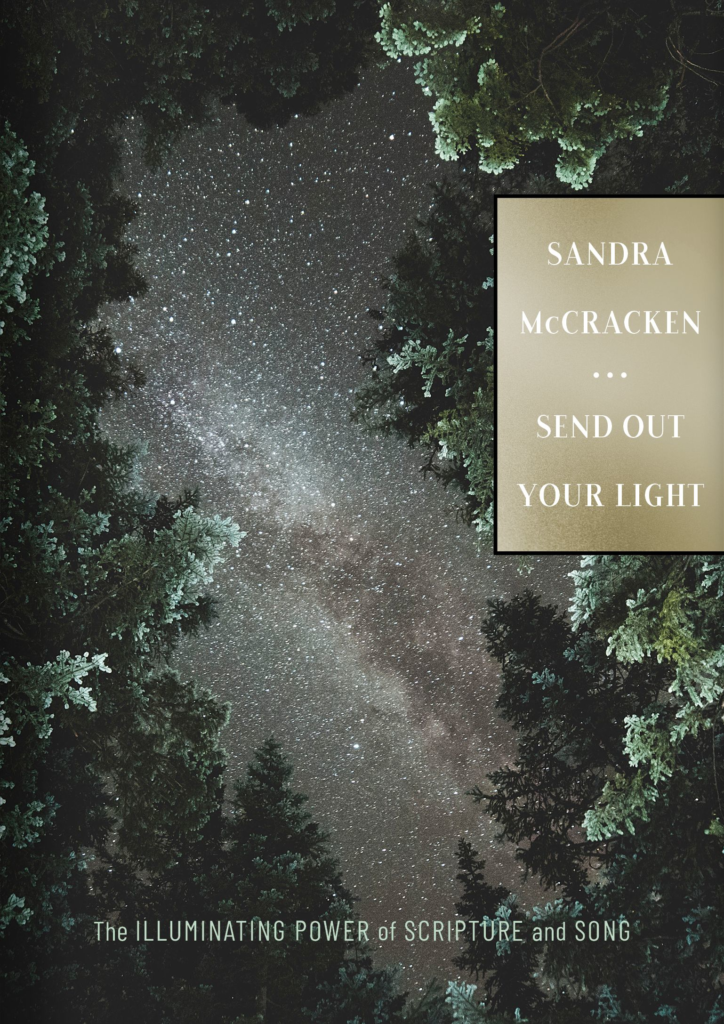I remember the first time I heard Sandra McCracken. I was sitting in a dark auditorium, a high schooler on a youth-group retreat, anticipating the start of a Caedmon’s Call concert when she came on stage to open the night. Little did I know how McCracken’s songs would become a companion in my faith, walking with me through college and pressing in deep during the adult years.
Send Out Your Light: The Illuminating Power of Scripture and Song reads like a conversation with a friend. In each chapter, McCracken picks up a topic, weaving together glimpses of her story, relevant Scripture, lyrics from her songs, and old hymns. She draws from diverse influences, quoting Henri Nouwen, N. T. Wright, and Tim Keller, but also Bob Dylan, Wendell Berry, and first-name-only friends like Russ and Thad. McCracken often pauses to address the reader directly, asking questions, wondering—like a true conversation partner—how a certain truth or piece of wisdom resonates and applies to our stories.
When we sit down for coffee with a friend, we do not expect bullet points or clean, linear outlines. It’s more like jazz, with each conversation partner taking the lead for a moment, each riffing off the other. We come into a conversation with the wisdom we have collected through years of wrestling with God, walking through suffering, reading good books, listening to the voices of mentors and pastors and friends. In the best conversations, we come like children offering a treasured collection of shells from a day at the beach, holding each one and wondering at its beauty, inviting our friends to do the same.
McCracken offers a treasury of grace: stories and songs, glimpses of the wisdom she has gleaned after years of faithfully sowing and reaping her little plot of land.

Send Out Your Light: The Illuminating Power of Scripture and Song
Sandra McCracken
Send Out Your Light: The Illuminating Power of Scripture and Song
Sandra McCracken
In the middle of Psalm 43, God offers a dynamic invitation: Send out your light. Singer-songwriter Sandra McCracken believes we each have the opportunity to hear and answer this invitation.
This book is written in three parts: becoming, disorientation, and reorientation.
This has been the shape of Sandra McCracken’s life. Through it all, songs and Scripture have been there to light the way, helping her respond to God’s call.
Three Lenses
Send Out Your Light is divided into three sections, the motif of light holding it all together. The first section focuses on the giving of light at the beginning of our stories, the ways God has shaped us to reflect his glory in our particular place. The second section explores the dark shadows of sorrow, loss and displacement, touching on McCracken’s journey through divorce and remarriage. The final section sends us out as God’s generative light in the world.
In the best conversations, we come like children offering a treasured collection of shells from a day at the beach.
Authors sometimes pose as experts with all the answers, sages given a special wisdom on the mountaintop, bringing it down to us in book form. But McCracken calls Send Out Your Light “one small notation of grace from me to you.” We’re all writing letters, in one way or another. You have the feeling that she would love to read your letter too.
McCracken uses metaphor and imagery well. “The human heart is a deep well,” she writes. “Throwing a bucket down there to see what’s in the depths may be scary . . . sometimes, I’ve expected to pull up new monsters from those deep places . . . [but] shame shrivels up when you bring it out into the sunlight of God’s love.” As a good songwriter, McCracken wants us to feel the truth of a thing, aiming to engage our imagination over and above our mental comprehension.
She engages a wide variety of topics, including identity, leading worship, the Psalms, community, and justice. Her openness about her prayer life, even in seasons of suffering, is especially poignant. She speaks of lament often: “an underutilized tool God has given us to express our emotions . . . to lament is to cry out to God with trust and expectation. It is offering holy complaint.”
She urges us to worship, even in suffering: “I have found one thing to be supremely true. The way through pain is praise.” She McCracken recounts praying through sadness, anger, and abandonment in a parking lot: “I sat up there for a long time under the orange street lights and I cried out to God like Robert Duvall in The Apostle.” Through many similar stories, McCracken encourages us to pray freely to the God who already knows our sorrows: “Tell him details about what happened this afternoon . . . give name to your fears. Catalog things with him that nobody else would even know. This is prayer.”
Awake to God’s Light
What shines through is the faithful life of a person awake to God. McCracken seems to live with her antenna up, her life open to God’s beauty and the movement of the Spirit. A journey through the ruins of a castle in Ireland becomes deep wisdom about thresholds in a home, endings and beginnings. Her spotting of an endangered bird on a hike in Hawaii becomes a lesson in lament and grief. How many of us would have simply taken a selfie with the ruins or the birds, posted a picture to social media and moved on? As McCracken asks at the beginning of the book, “How much do we miss that comes to us as a slow beauty?”
Her sacramental life, artistic vision, and quiet attentiveness to God and others is refreshing, especially in this loud, distracted, digital age. We all want to live this way: antenna up, awake to the wonder and ways of God.




































